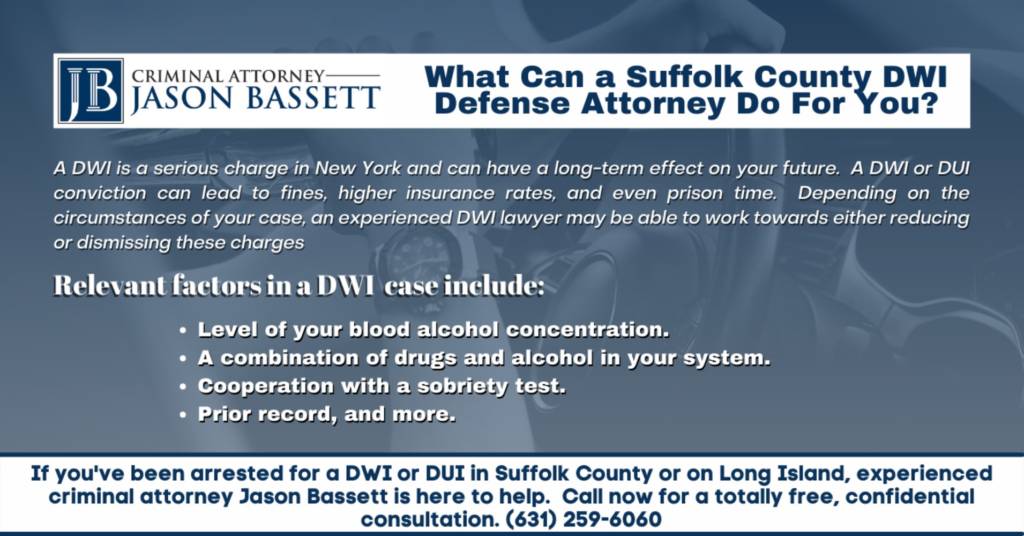Driving is society’s easiest and most convenient means of transportation and because there are a lot of drivers on the road, it’s always important to be as safe as possible. However, there is a very fine line that determines what is considered safe while operating a vehicle, especially when it comes to DWI-related charges and convictions. The laws for DWI on Long Island are very strict and the consequences can be life-altering without a proper defense. The repercussions associated with this kind of offense make it very easy to feel like you’ve made your bed and you have no other choice but to lie in it, but that’s not always the case. This is why it is crucial to bring your case to a DWI lawyer that can help you explore all of your options.
What if this is my first DWI offense on Long Island?
If this is your first offense with a DWI charge or conviction, it may help your defense but it really depends on the entire situation and the level of intoxication. Once a DWI report is submitted, the offense goes into the hands of the District Attorney. The District Attorney is only able to make decisions based on the information given in the report. There are policies put in place that determine the severity of the charge that is based on the results of the reported BAC.
For instance, in Nassau and Suffolk County, if BAC is between .05% and .07% it may not be considered a criminal offense but rather an infraction which could still involve consequences such as fines, license suspension, and in some cases even jail time. If BAC is between .08% and .17% the consequences are much more serious and could result in a misdemeanor or worse.
What options do I have to build a defense against my DWI?
There are many different ways to approach building a defense that could potentially reduce or drop the charges of a DWI on Long Island. Much of the evidence gathered for the offense is based on subjective tests. For example, if an arrest was made due to the results of a field sobriety test, that kind of evidence is based on the judgment of the arresting officer and could be contested. Another commonplace where evidence can be found to build a defense is in the arrest report. There could be legal technicalities in the report that could work in favor of the defense.
Those are just some of the breadcrumbs that could begin to build a solid defense case against a DWI offense. It is always going to be the best-case scenario to work with an attorney experienced in DWI cases.
Can a DWI lawyer guarantee that my offense will be dropped or reduced?
Unfortunately, no. There is never ever any guarantee when it comes to a defense case, but that doesn’t necessarily have to mean that you are doomed. Your chances of achieving the best possible outcome for your case are much better when you have an experienced attorney working by your side.
New York BAC Chemical Testing
Breathalyzers and BAC chemical tests are often used by law enforcement officers to seek a DWI conviction. These methods, however, are not conclusive evidence that a person was drunk driving and they do not constitute an automatic conviction. The possibility of the arresting officers making a mistake in handling the situation is always present. An experienced Long Island criminal defense attorney may use these possible errors to defend someone who is facing a DWI charge in New York.
New York courts require that drivers who are arrested for drunk driving must submit to a breath test to determine their BAC. This means that drivers who drive cars in New York state consent to having their system tested for alcohol.
Refusing to submit for testing after being pulled over could result in your driver’s license being revoked. There may also be other penalties such as fines or suspension of their license. If the driver insists on their refusal of the test, they are entitled to request a DMV hearing. Having a skilled DWI lawyer when facing DWI charges can boost the driver’s chances of having a favorable outcome.

Criminal attorney, Jason Bassett, is a highly regarded DWI/DUI lawyer on Long Island.
What is going to be important when it comes to finding counsel for a DWI offense is to thoroughly do your research. Choosing an attorney is an important decision and every case and every client is unique in its own way. It’s our recommendation to choose an attorney that will dedicate their time and attention to understanding the details of your case and who will strive for an outcome that will be within your best interest. Attorney Jason Bassett may be able to provide the legal assistance you need if you are facing DWI charges in New York. Contact us today to schedule a consultation.
Suffolk County Criminal Lawyer | Criminal Attorney Jason Bassett Armvm_andrei https://jbassettlaw.com/is-it-worth-fighting-a-dwi-in-new-york/ Is it worth fighting a DWI in New York?source https://jbassettlaw.com/is-it-worth-fighting-a-dwi-in-new-york/



